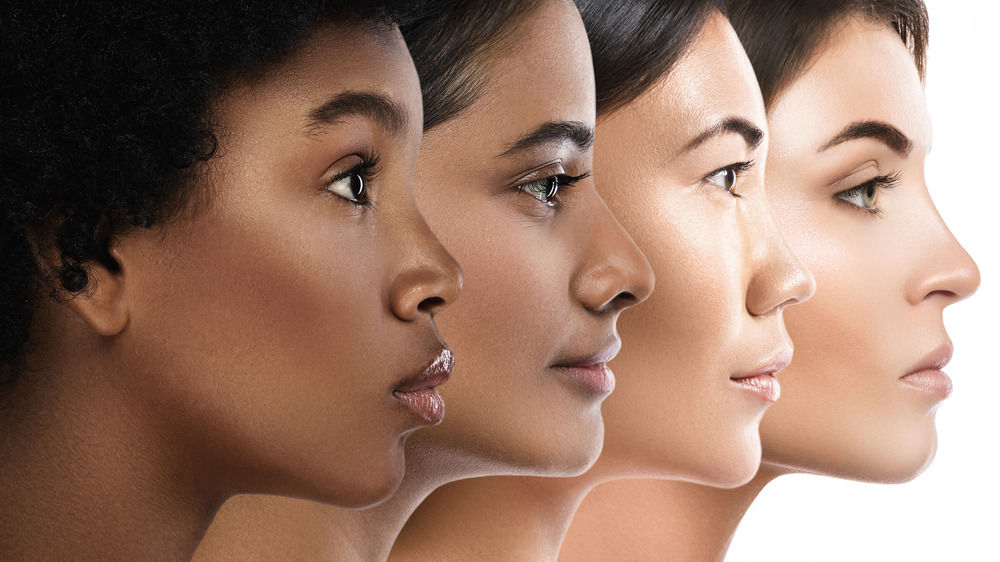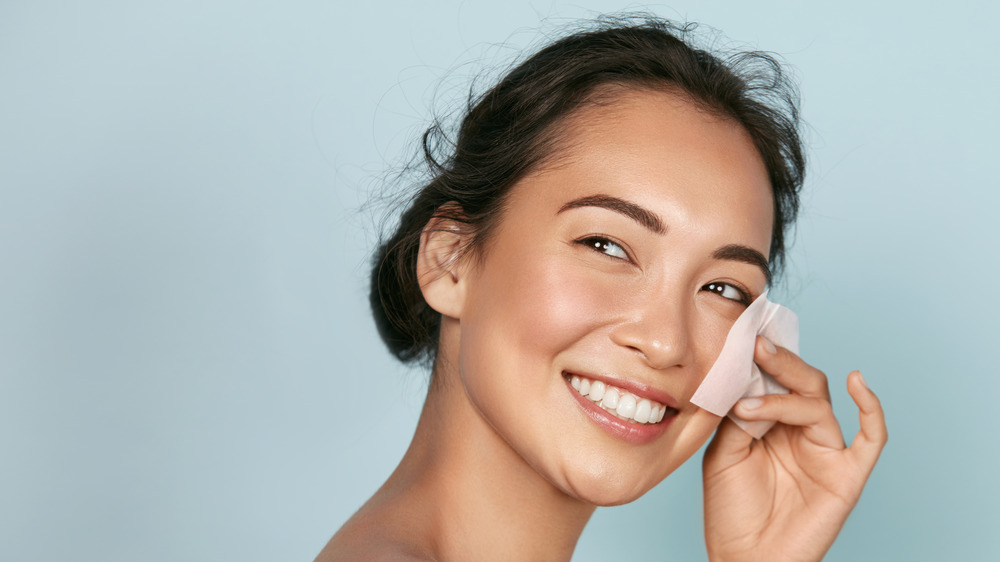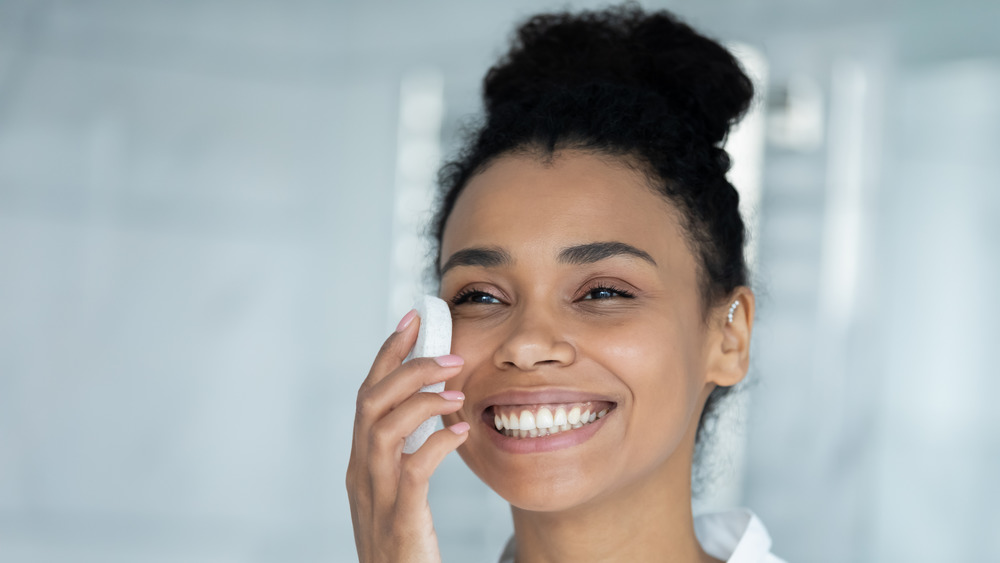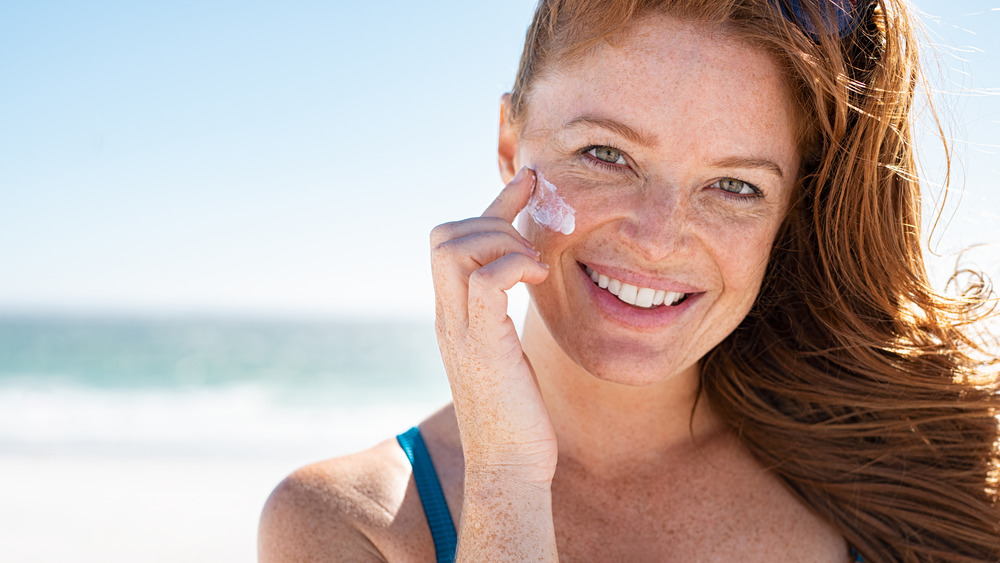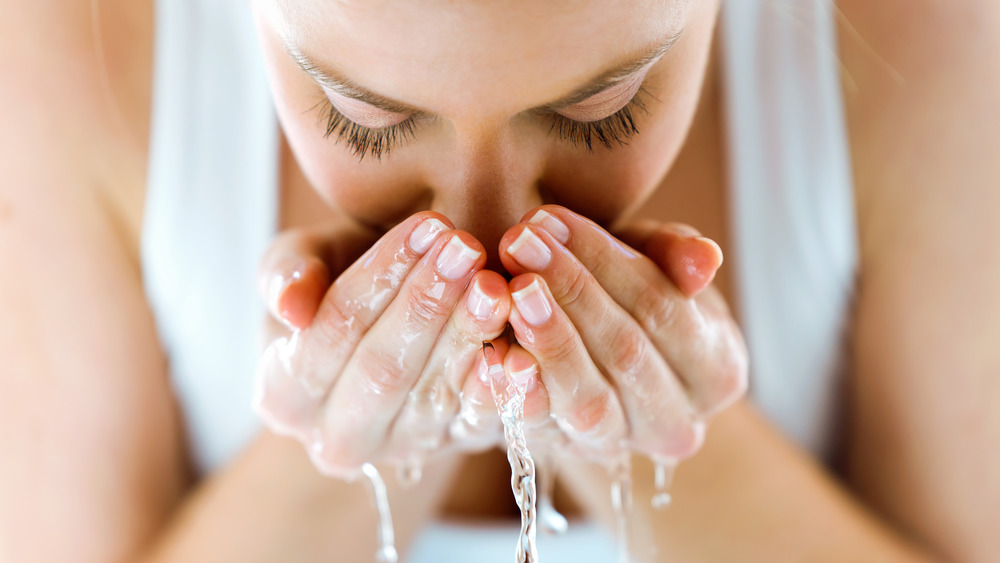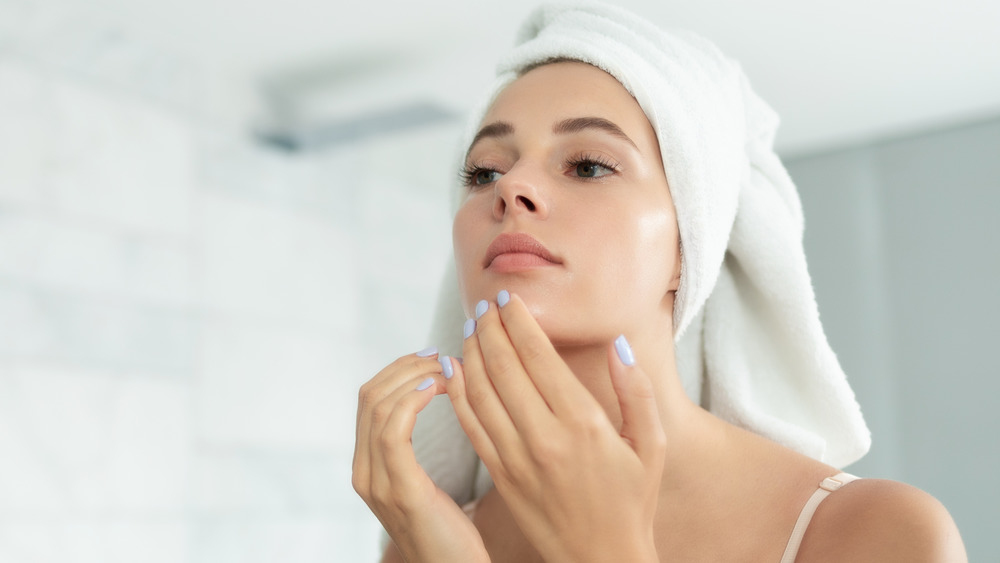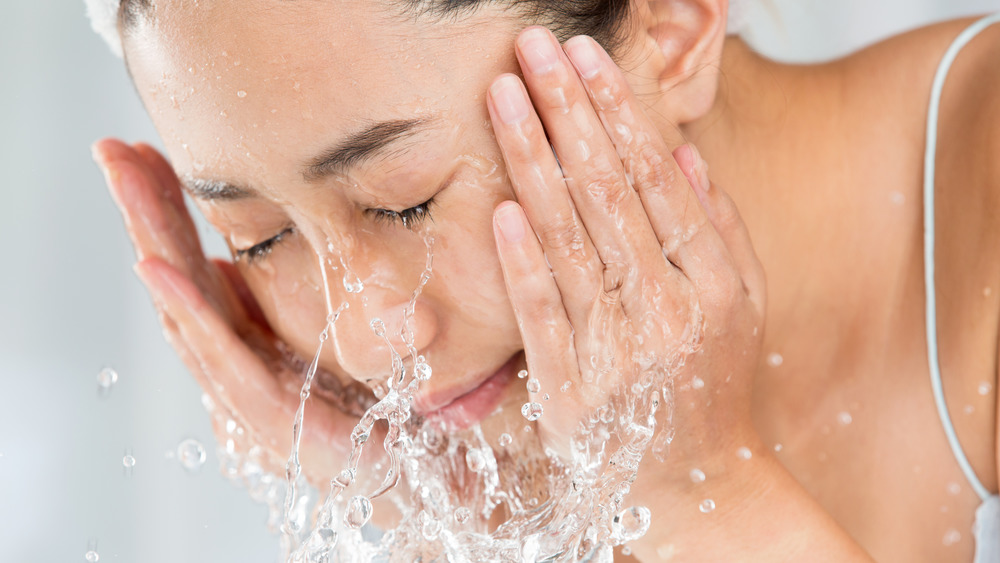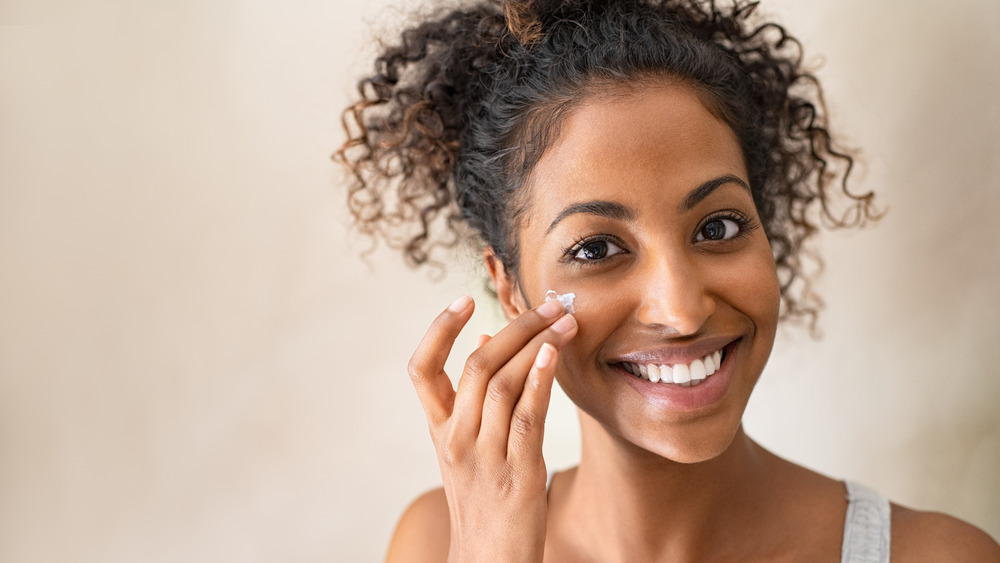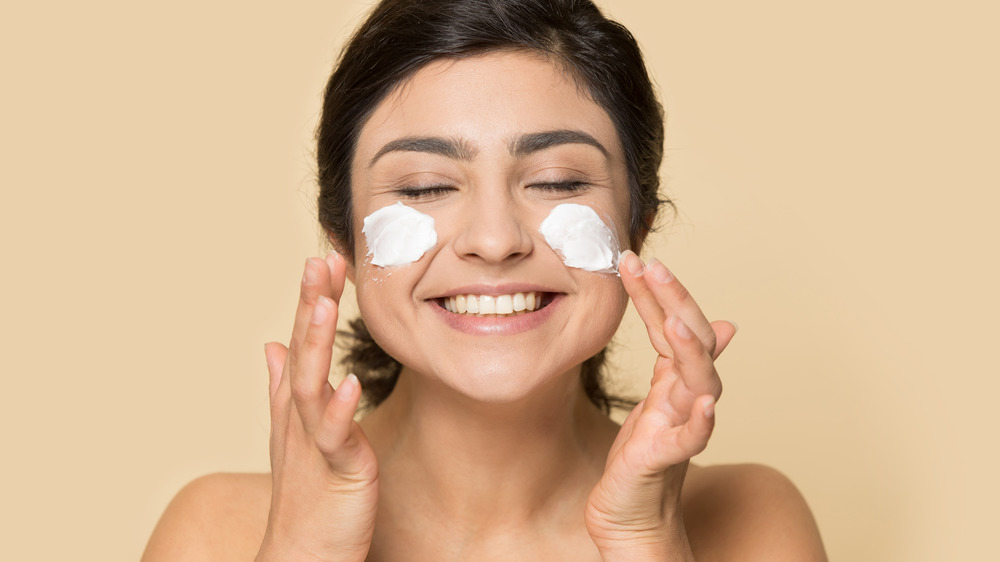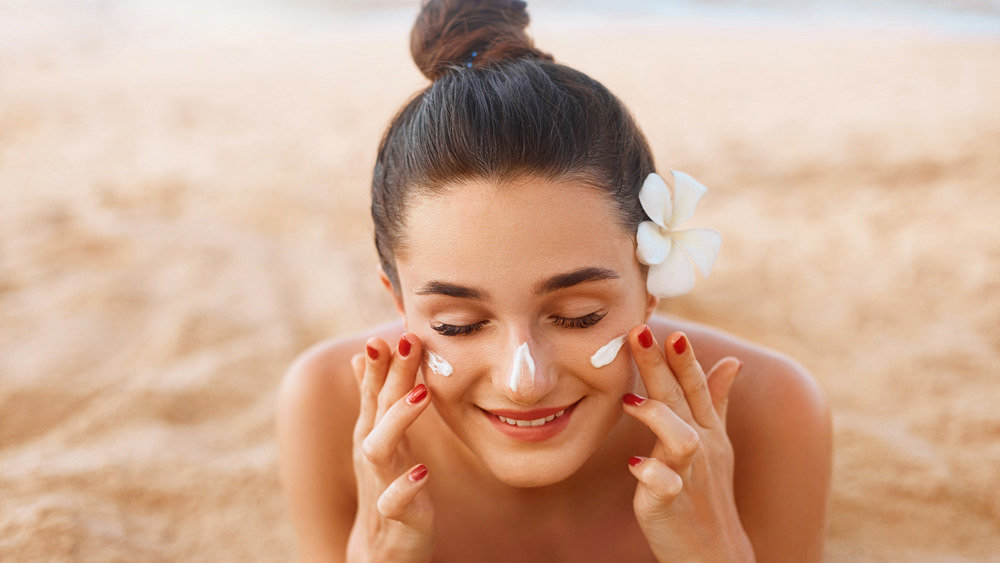The Truth About Your Skin Type
We may receive a commission on purchases made from links.
Taking care of your skin's unique type is seriously important, as just about every adult realizes at some point in their life. No matter how old you are, having healthy, vibrant skin is something everyone desires, and even though makeup is awesome, it's important to take care of your skin under your makeup. Skin care may be trendy, and part of that elusive "self-care" people constantly talk about, but skin care isn't just something to do when you're stressed or having a breakout.
Skin care is meant to be year-round, but because there are a few different skin types, everyone's perfect skin care routine will look different from one another (via Today). Just think about your skin, and then your best friend's skin. They probably look totally different, and you both likely face different problem areas. Maybe they have more breakouts, and you have more dryness, or it's the other way around. Whatever the case, the truth about your skin type is that knowing what it is and how to care for it can make a world of difference.
First, identify your skin type
Everyone has a different skin type, and even if you think you know what yours is, it's best to be sure. The most common skin types are oily, dry, combination, acne-prone, sensitive, and yes, even normal skin. According to Dermstore, it's important to know your skin type so you're able to properly care for it without accidentally causing even more issues.
For instance, if you think you have oily skin just because you breakout a lot, you might just have acne-prone skin. Oily skin is typically easy to spot, as your face is probably pretty shiny. Dry skin, on the other hand, is also easy to spot, as you likely have some flakes or itchiness. Then there's combination skin, which means you have both oily and dry areas on your face, and that's totally common. Sensitive skin means you have a hard time finding products that don't irritate you, and normal skin is no more normal than any other skin type — it just means you don't have one specific problem area at all times.
Once you know your skin type, you'll know all the secrets to royally perfect skin, and get that perfect glow.
For oily skin, a good cleanser is everything
If you've determined your skin type to be oily, then you might assume it's most important to combat all that oil on your face with a solid, oil-removing cleanser. And, that's partially true; a good cleanser is everything for oily skin, but make sure that it doesn't strip away all the oil on your face.
According dermatologist Dr. Heidi Waldorf, the best kind of cleanser for oily skin is actually an oil-based face wash, because it will reduce the sebum on your skin without drying it. "Your skin should feel soft, not tight, after washing," she explained in an interview with Cosmopolitan. If you're curious, here are the differences between oil-based cleanser and water-based cleansers.
Additionally, it's important not to use any products that are too harsh, because "although they can dehydrate the skin's surface temporarily, they can be irritating, causing skin to produce more oil," says Jordana Mattioli, a medical esthetician at Complete Skin MD in NYC. And that's exactly what you don't want to happen.
Yes, you should keep your skin moisturized if you have oily skin
Just like it's important not to use an ultra-harsh cleanser on oily skin, no part of your skin care regimen should include stripping your skin of your natural oils. It might sound counterintuitive, but you still need to be careful with oily skin, and not dry it out too much.
Specifically, Andrea Pfeffer, founder of Pfeffer Sal, told Elle that if you have oily skin, you need to still be gentle with it. "A disrupted skin barrier can lead to sensitivity, breakouts, inflammation and dehydration," she explained. So, watch out for anything that's going to damage your skin barrier.
Additionally, you should still be using moisturizer if you have oily skin, as strange as that might sound. But, be mindful of the kind of moisturizer you use. "Your skin probably won't appreciate thick heavy moisturizers, so avoid any creams with rich plant butters as these are likely to be too rich and lead to congestion," Pfeffer continued. Also, stop eating these foods if you have oily skin.
This device could save your dry skin
On the opposite end of the spectrum of oily skin is obviously dry skin. Dry skin can be especially irritating, as it can seem as though no amount of moisturizers or serums will help. But as it turns out, the truth about dry skin is that it requires a little more work than just slathering some coconut oil on your face.
According to dermatologist Dr. Shari Marchbein, there's one device everyone with dry skin should have in their home, and it's not a jade roller. "A cool air humidifier increases the moisture level in the air," she told Vogue. That then, in turn, helps your skin's barrier in staying hydrated. On top of that, your house should never be too cold as that causes even more dryness in the air, and can make your dry skin more irritated.
Taking care of your dry skin also obviously requires a good skin care routine, but adding a humidifier to your living space will also help insure that the environmental factors are benefiting it as well.
Exfoliation matters for dry skin
If you have dry skin, you might be a little fearful of exfoliation. After all, those harsh apricot scrubs from when you were a preteen certainly made your skin feel raw. But fortunately, exfoliation has come a long way since then, and there are ways you can scrub away the impurities on even the driest of skin.
The key to managing dry skin is actually all in the exfoliation: you want to clean your skin and remove all the flakes of dead skin, but without irritating it. "Pick up a gentle scrub," dermatologist Dr. Shari Marchbein told Vogue. "Something with a mild glycolic or lactic acid to get off the dead skin." Obviously, don't scrub your dry skin too roughly, but once you do exfoliate well, "[serums and] moisturizers can penetrate and really get to work," Marchbein added.
If you're wondering how to tell what the best exfoliator for you is, Allure recommended this Shiseido scrub for dry skin, and Vogue suggested this drug store find. In short, there's no reason to fear exfoliation for dry skin, because the truth is, it needs it.
If you have sensitive skin, try to avoid certain ingredients
Unfortunately, even though it's pretty easy to determine if you have sensitive skin, it isn't easy to deal with. Still, it's pretty common, as noted by dermatologist Dr. Ellen Marmur. "Over 60 percent of my patients describe their skin as sensitive in some way," she shared in a chat with Good Housekeeping.
If you've ever dealt with a bad reaction to a product or even just your environment, you might have sensitive skin. If that's the case, it's super important to be diligent about what you're putting on it. Specifically, check the ingredients before you buy any kind of skin care product, as some skincare products can do more harm than good. "Generally speaking, when dealing with sensitive skin I follow the principle that less is more," dermatologist Dr. Shilpi Khetarpal told Self. "Products with less ingredients are better for those with sensitive skin."
If you want some specific options for cleansers for sensitive skin, Dr. Noelani Gonzalez, the director of cosmetic dermatology at Mount Sinai West, told Self that "gentle cleansers with minimal ingredients in them, like Cetaphil Gentle Cleanser or Neutrogena Gentle Cleanser" are ideal.
Testing products is key for anyone with sensitive skin
Because you truly never know what will cause a reaction when you have sensitive skin, it can feel impossible to find a product that helps your skin stay healthy and vibrant. And even if a product is designed for sensitive skin, that doesn't necessarily mean that it won't cause you to breakout or exacerbate any existing skin condition, either.
So, when you buy a new skin care product, be it a moisturizer or toner or serum, there's one surefire way to make sure you won't have a negative reaction to it, says dermatologist Dr. Shari Lipner. "If you have sensitive skin, always test a small amount of the new product on the inside of your arm overnight," she revealed in an interview with Self. "If you have no reaction in the morning, then it is safe to apply it to your face."
Additionally, just because a product is "natural" doesn't mean it's safe for your sensitive skin, especially if it has essential oils in the ingredients, so be sure to spot test it.
Acne-prone skin needs the utmost care and cleanliness
While just about everyone will suffer from a breakout or two at some point in their lives, having acne-prone skin is an entirely different kind of problem. People with acne-prone skin likely have to deal with pimples and breakouts constantly, and it might seem like nothing can help. But fortunately, keeping things clean is a good start.
Obviously, anyone with acne-prone skin should wash their face regularly, especially if you wear makeup or workout frequently. "Sweat is released through visible pores in the skin," dermatologist Dr. Janelle Vega told Teen Vogue. "When makeup covers those pores, that barrier doesn't allow the sweat to make it to the surface of the skin, which can lead to clogged pores." And that can render your skin a breeding ground for pimples.
Additionally, washing your phone, pillowcases, and hair can help clear up a lot of unwanted zits. Basically, if you have acne-prone skin, the truth is that you have to be very thorough about anything that touches your face, including headphones and glasses, believe it or not. Surprisingly, they can cause acne.
You might want to change your diet for acne-prone skin
While there are a myriad of products specially designed for acne-prone skin, such as the cult-favorite Ultra-Clarifying Face Oil by Sunday Riley, one way you can help reduce the number of breakouts you get is to examine your diet. Yes, as much as it might suck, people with acne-prone skin should probably steer clear of certain foods if they want the best chance of banishing breakouts once and for all.
According to Healthline, eating a diet rich in complex carbohydrates, zinc, vitamins A and E, as well as antioxidants could prove to be beneficial for acne-prone skin. Specifically, trying to get in more antioxidants could really improve your skin, says dermatologist Dr. Melanie Palm. "Dark chocolate with more than 70 percent cacao is an excellent source of antioxidants, which has a protective role for the skin and other organs," she shared with Insider.
However, there's one ingredient that you might want to cut out and see if your skin clears up. As it turns out, dairy can trigger breakouts, so you may want to try non-dairy replacements for a while. But don't think about going dairy-free until you read this.
Combination skin can be frustrating and might require change-ups
Because no one has the same skin as anyone else, it can be sometimes be difficult to figure out your exact type, especially if you experience a little bit of everything. In that case, you might have combination skin. "If your forehead, nose and/or chin (your T-zone) are generally oilier and your cheeks tend to be dry, then you have combination skin," facialist Boldijarre Koronczay told Cosmopolitan.
Unfortunately, the truth about combination skin is that it might require change-ups. "Combination skin needs a different type of cleansing at different times of the day," Koronczay continued. Specifically, she suggests using a foaming face wash in the morning to help with oil, and then a creamier cleanser at the end of the day to keep skin moisturized.
Having combination skin can mean that you need more moisturizer certain times, and more exfoliation at other points. No matter what, it's important to know the signs your skin needs a new skin care routine.
Combination skin requires some maintenance
Because combination skin doesn't simply mean that you only need more moisture or less oil, or that you don't just break out, it can be hard to manage. And really, combination skin requires some maintenance, because you never really know what your skin needs might be on a daily basis. However, there are some tips to help with combination skin, and they might just make all the difference.
Dr. Lindsey Zubritsky, a dermatologist, told Women's Health that for her own personal combination skin, she has leaned to "skip my moisturizer entirely or I switch to light weight, gel-based moisturizer," in the summer. "I also tend to increase the strength of my retinoid in the summer season when my skin can easily tolerate the increased potency."
Additionally, facialist Boldijarre Koronczay explained to Cosmopolitan that combination skin really is the most high-maintenance skin type. "Rather than storing products in your bathroom or dressing table, put them in the refrigerator," she shared. That will help to reduce "inflammation and redness when applied to the skin." Combination skin, in short, is a total diva.
If you have normal skin, an anti-aging routine is a good idea
Now, if you don't think you have oily, dry, acne-prone, sensitive, or combination skin, you could be right. You could actually have normal skin, which means that you probably don't break out a ton, have issues with new products, or struggle with too much or too little oil, according to Dermstore. But, if you have normal skin, then an anti-aging routine is probably a good idea.
As odd as it might sound, an anti-aging skin care routine could be implemented as early as your 20s, according to Insider. But what exactly does that look like for someone with normal skin? Well, there are certain ingredients you should look out for in order to be prevent wrinkles. As dermatologist Dr. Shari Marchbein explained to Self, these ingredients are good for normal skin types, especially. "The purpose of using anti-aging skin care products containing ingredients such as vitamin C, retinoids, sunscreen, peptides, etc. is to minimize the impact of both intrinsic and extrinsic factors on skin," she shared. So, grab that vitamin C serum, as it will completely transform your skin!
Always use sunscreen for any skin type
While it's true that knowing your specific skin type is important for myriad of reasons, there's one universal truth that isn't dependent on whether or not your skin is oily or dry. No matter what, you should always use sunscreen. Obviously, you know sunscreen can help protect you from skin cancer, but it's so much more than that. "Sunscreen is without a doubt the single best thing you will do to protect your skin," dermatologist Dr. Shari Marchbein told Self.
And yes, even if you don't go lay out by a pool or take a long hike outdoors, sunscreen is still necessary. "Completely indoor activities don't require sunscreen, but many of us discount the sun that we get on a daily basis from just running errands and all the 'incidental' sun damage adds up," clinical professor of dermatology Elizabeth Tanzi revealed to Allure. "That's why we recommend daily sunscreen application, so you are always protected and don't have to think about it."
Make sunscreen part of your routine, and you won't regret it.
No matter what your skin type, consult a dermatologist
It's no secret that being informed about your skin type and its specific needs is helpful to give you the ultimate glow. But, that doesn't mean you should always take matters into your own hands. Specifically, if you have recurring skin issues, such as acne or sensitivity, or anything else, it's never a bad idea to make an appointment with a dermatologist.
A dermatologist will be able to address your skin needs head-on, tell you your skin type, and even write you a prescription for a topical or oral medication. In fact, Florida-based dermatologist Dr. Leyda Elizabeth Bowes shared with Cosmopolitan that anyone with skin care concerns should see a professional rather than try to treat the problem themselves. Specifically, Bowes said that trying to cure acne or any kind of breakout with some concoction made in your kitchen is a bad idea. "Frankly, all that will make the skin worse," she said. So listen to the doctor, and step away from the lemon juice.

